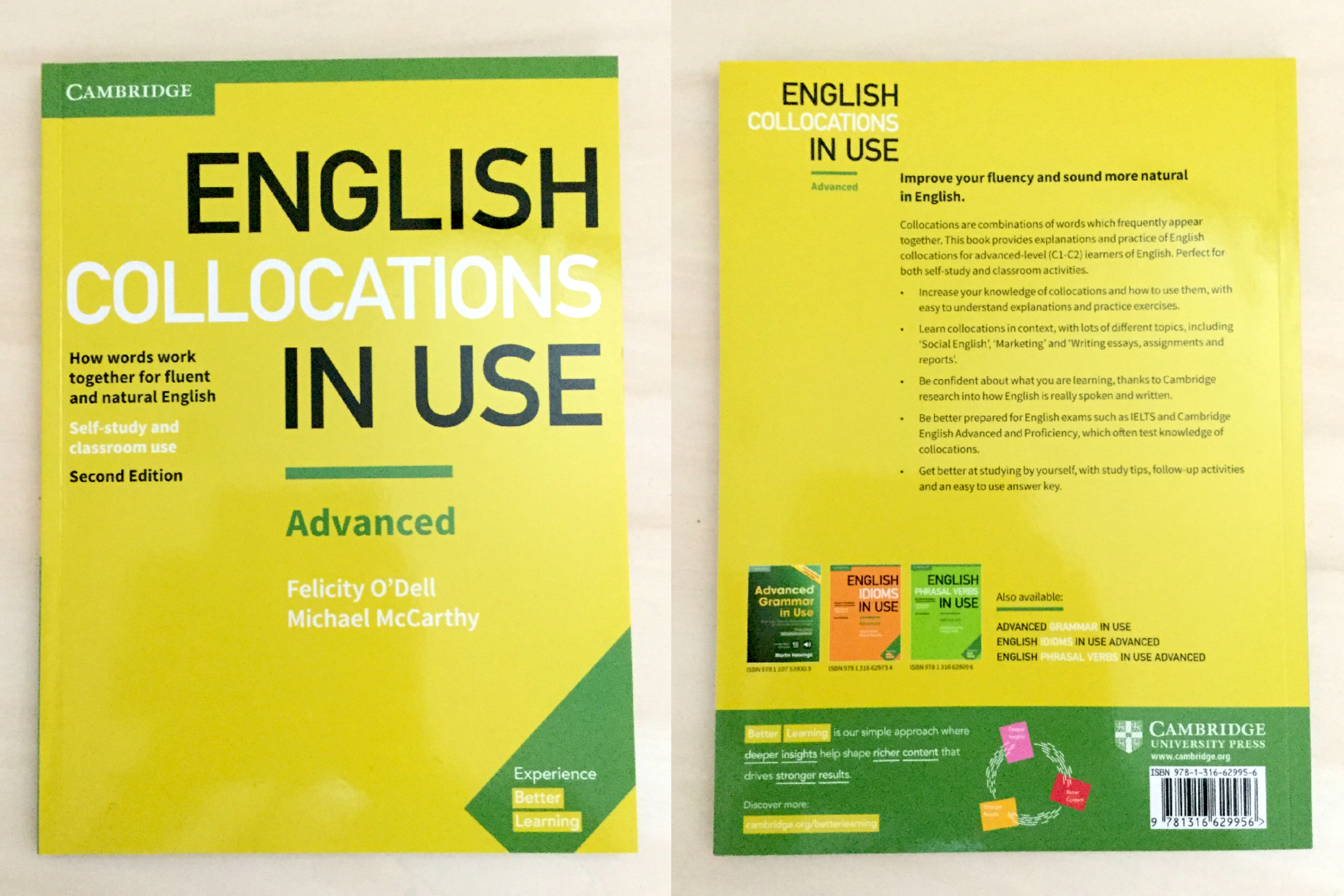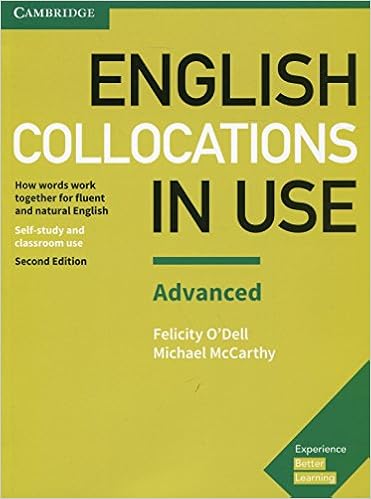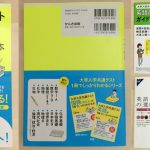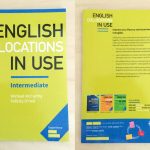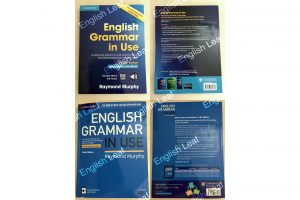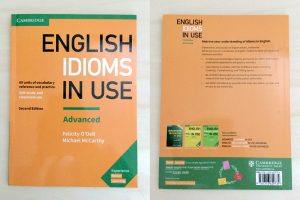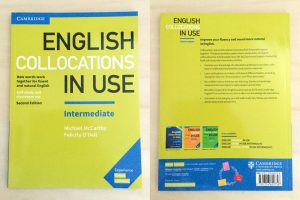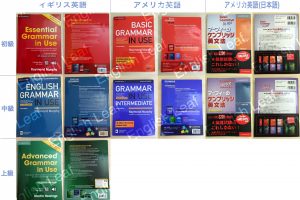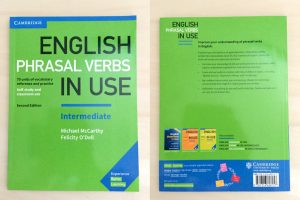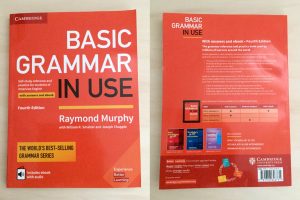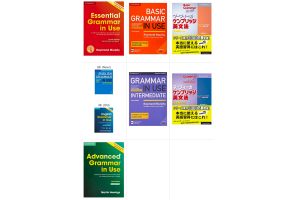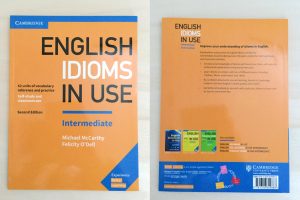【文法書のバイブル! English Grammar in Useシリーズの種類と選び方】も確認する
English Grammar in Useからのコロケーション上級
collocationとは、単語と単語のよく使われる組み合わせやつながりのことで、日本語では連結関係と訳されます。例えば、英語では強い風をstrong windと言うのが自然で、heavy windとはあまり言いません。本書では、このようなcollocationを使いこなせるように解説しています。中級と上級にレベルが分けられていて、本書は上級です。
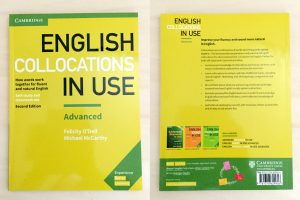
Contents
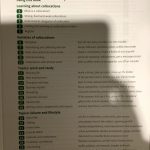
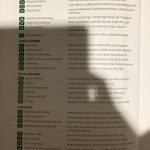
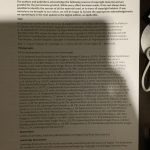
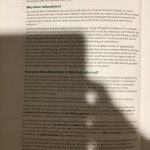
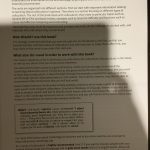
Acknowledgements
Using this book
Learning about collocations
1 What is a collocation?
2 Strong, fixed and weak collocations
3 Grammatical categories of collocation
4Finding and working on collocations in texts
5Register
Varieties of collocations
6 Metaphor foot the bill, heavy burden, run into trouble
7Intensifying and softening adverbs deeply offensive, spotlessly clean, wildly inaccurate
8 Make and verbs that mean make make a contribution, make a habit of, turn a profit
9 Communicating generally speaking, talk business, get a message across
10 Collocations with phrasal verbs Topics: work and study take up office, work up an appetite, see off an intruder
11 Working life make a living, take up a post, move up the ladder
12 New employment fit the job description, land a new job, menial tasks
13 Thoughts and ideas bear in mind, widespread belief, jump to conclusions
14 Business reports fierce competition, stimulate growth, hike in prices
15 Marketing consumer demands, product development, market share
16Customer services fit for purpose, kick up a fuss, grounds for complaint
17 Student life gifted child, mature student, thirst for knowledge
18 Writing essays, assignments and reports Topics: leisure and lifestyle
19 Social life working hypothesis, confront issues, critical analysis
20 Talking call for a celebration, social whirl, play host to
21 In the news juicy gossip, broach the subject, opening gambit
22 Current affairs declare independence, reach agreement, bow to pressure
23 Festivals and celebrations refuse point-blank, decline to comment, gauge reaction
24 Cosmetics and fashion date back to, movable feast, propose a toast
25 Commuting flawless complexion, set the trend, fashion victim
26 Travel and adventure traffic gridlock, rail network, lengthy tailbacks
27 Sport get itchy feet, off the beaten track, leg of the journey
28 Plans and decisions keep in shape, reach fever pitch, score an own goal
29 Film and book reviews toy with an idea, tentative suggestion, deciding factor
English Collocations in Use Advanced star-studded cast, glowing reviews, hold one’s attention
Topics: the modern world
30 Regulations and authority minimise danger, grant permission, faceless bureaucrats
31 The environment dump waste, searing heat, offset carbon emissions
32 Town and country life back of beyond, rural idyll, urban regeneration
33 Personal finance clear one’s debts, agreed credit limit, identity theft
34 The economy curb inflation, safeguard one’s interests, plummeting profits
35 Social issues antisocial behavior, dysfunctional family, unfit for human habitation
36 Science and technology harness technology, cutting-edge design, Wi-Fi hotspots
37 Health and medicine build up resistance, adverse reaction, shake off a cold
38 Criminal justice custodial sentences, trumped-up charges, beyond reasonable doubt
39 War and peace deploy troops, pre-emptive strike, collateral damage
Topics: people
40 Friendship lifelong friends, platonic relationship, moral support
41 Youth and age child prodigy, go through a midlife crisis, senior moment
42 Celebrities and heroes lavish lifestyle, meteoric rise to fame, heap praise on
43 Negative opinions about people bone idle, poison the atmosphere, nasty piece of work
44 References act as a referee, accumulate experience, financial acumen
45 Personality and behavior stubborn streak, boundless energy, act one’s age
Basic concepts
46 Space and time cramped conditions, waste of space, go down in history
47 Sound husky voice, incessant noise, let out a cry
48 Making things easier viable options, simplicity itself, take the easy way out
49 Difficulty severe blow, hinder progress, encounter difficulties
50 Quantity and size finite number, endless supply, unknown quantity
51 Change Functions sweeping changes, would make a change, sudden shift
52 Stopping and starting bring a halt to, close off a street, dispel rumours
53 Cause and effect root cause, provoke an outcry, dire consequences
54 Describing groups and amounts swarm of bees, flurry of activity, stroke of genius
55 Comparing and contrasting bear little resemblance to, polar opposites, draw a comparison between
56 Making an effort give it one’s best shot, abortive attempt, hard slog
57 Social English not lose any sleep, to be brutally honest, be on the go
58 Discussing issues make a commitment, give a straight answer, miss the point
59 Negative situations and feelings
60 Positive situations and feelings
Key
Index
Acknowledgements
Joy Goodwin wrote two new units for the Second Edition: Unit 15, Marketing, and Unit 25, Commuting. The publishers would like to thank Joy for her contribution to this edition. The authors and publishers acknowledge the following sources of copyright material and are grateful for the permissions granted. While every effort has been made, it has not always been possible to identify the sources of all the material used, or to trace all copyright holders. If any omissions are brought to our notice, we will be happy to include the appropriate acknowledgements on reprinting & in the next update to the digital edition, as applicable. Text:
NI Syndication Limited for the text on p. 12 adapted from I need help with my homework’ by Rebecca O Connor, The Times, 24.03.2007. Copyright © NI Syndication Limited; Eye For Film for the text on p. 12 adapted from ‘The Interpreter’ by Angus Wolfe Murray, http://www.eyeforfitm.co.uk/review/ the-interpreter-film-review-by-angus-wolfe-murray. Copyright © 2005 Eye For Film. Reproduced with permission; HostelBookers.com Ltd. for the text on p. 56 adapted from ‘A selection of Great European Train Routes, London-Tangiers. Copyright © HostelBookers.com Ltd. Reproduced with kind permission. Key: T = Top, B = Below, TR = Top Right, CL = Centre Left, CR = Centre Right, BL = Below Left.
Using this book
What is a collocation?
Collocation means a natural combination of words; it refers to the way combination of words; it refers to the way English words are close conciliated with each other. For example, pay and attention go together, as do commit blond goes with hair and heavy with rain.
Why learn collocations?
You need to learn collocations because they will help you to speak and write English in a more natural and accurate way. People will probably understand what you mean if you talk about a crime or say there was very hard rain this morning, but your language will sound unnatural might perhaps confuse. Did you mean that there was a lot of rain or perhaps that there was hailstorm?
Learning collocations will also help you to increase your range of English vocabulary. For example you’ll find it easier to avoid words like very or nice or beautiful or get by choosing a word that fits. context better and has a more precise meaning. This is particularly useful if you are taking a written exam in English and want to make a good impression on the examiners. In advanced level exams. marks are often specifically awarded for the appropriate handling of collocations.
At an advanced level, an appreciation of collocation can also be helpful in terms of appreciating other writers’ use of language. Skilled users of the language may choose to create effects by varying the normal patterns of collocation, with the aim of either startling or amusing their audience. This technique is particularly popular with poets, journalists and advertisers.
From an appreciation of the way in which creative writers play with language, you may then even want to move on to use words in more original ways yourself. You are more likely to be able to do this effectively if you have assimilated the standard patterns of language use presented in this book.
How were the collocations in this book selected?
The collocations presented in this book were mainly selected from those identified as significant by the CANCODE corpus of spoken English, developed at the University of Nottingham in association with Cambridge University Press, and the Cambridge International Corpus of written and spoken English (now known as the Cambridge English Corpus).We also made extensive use of the Cambridge Learner Corpus, a corpus of student language which showed us what kind of collocation errors learners tend to make.
These corpora show that there are many thousands of collocations in English. So how could we select which ones would be most useful for you to work on in this book?
Firstly, of course, we wanted to choose ones that you might want to use in your own written and spoken English. So, in the unit Health and medicine we include, for example, shake off a cold and respond well to treatment but not grumbling appendix, which is a strong collocation, but one which – we hope – most of you will not feel the need for.
Secondly, we decided it would be most useful for you if we focused on those collocations which a not immediately obvious. A pretty girl, a modern car or to buy a ticket are all collocations, but they are combinations which you can easily understand and produce yourself without any problems.
So we deal here with less obvious word combinations, for instance, flatly contradict (not strongly contradict) and bitter enemies (not serious enemies).
Some of you may have already used our English Collocations in Use targeted at inter In general, we have tried to avoid focusing on collocations that we dealt with in the exception is with collocations that the Cambridge Learner Corpus highlighted as causing even in advanced level exams.
We felt that it would be useful to draw problems for students, even in advanced level exams. We felt that attention to such collocations again. even if we had dealt with them previously.
Idioms can be seen as one type of collocation. We deal with them separately in English Idioms in Use, and so do not focus on them here.
How is the book organised?
The book has 60 two-page units. The left-hand page presents the collocations that are focused on in the unit. You will usually find examples of collocations in typical contexts with, where appropriate, any special notes about their meaning and their usage. The right-hand page checks that you have understood the information on the left-hand page by giving you a series of exercises that practise the material just presented. The units are organised into different sections.
First we start with important information relating to learning about collocations in general. Then there is a section focusing on different types of collocation. The rest of the book deals with collocations that relate to particular topics such as Student life or Film and book reviews, concepts such as Sound or Difficulty and functions such as Cause and effect or Comparing and contrasting. The book has a key to all the exercises and an index which lists all the collocations we deal with, and indicates the units where they can be found.
How should I use this book?
It is strongly recommended that you work through the six introductory units first, so that you become familiar with the nature of collocations and with how best to study them. After that, you may work on the units in any order that suits you.
What else do I need in order to work with this book?
You need a notebook or file in which you can write down the collocations that you study in this book, as well as any others that you come across elsewhere. You also need to have access to a good dictionary. At this level we strongly recommend the Cambridge Advanced Learner’s Dictionary as this gives exactly the kind of information that you need to have about collocations.
It does this both through the examples provided for each word entry and through special collocations boxes or mini-panels. Your teacher, however, may also be able to recommend other dictionaries that you will find useful. Good modern learners’ dictionaries include example sentences which make a point of illustrating each word’s most frequent collocations.
Enormous databases of language, known as corpora, are used to analyse speech and text to identify which words collocate most frequently. Look up the word abject in the Cambridge Advanced Learner’s Dictionary and you will find the entry below. Notice how frequent collocations are used in the example sentences.
abject æb.us/error, etc. when you live in abject po
abject /’æb.dzekt/ adjective FORMAL EXTREME 1 abject misery/poverty/terror, etc. when someone is extremely unhappy, poor, frightened, etc: They live in abject poverty. o This policy has turned out to be an abject failure. NOT PROUD 2 showing no PRIDE or respect for yourself: an abject apology o He is almost abject in his respect for his boss.. abjectly /’æb.dzekt.li/ adverb
For more information about Cambridge dictionaries and to do online searches you could go to: http://dictionary.cambridge.org So, a study of collocation is highly recommended (Unit 7) if you want to impress people with your natural and accurate use of language and to gain more marks (Unit 1) in English exams. Above all, we hope both that this book gives you a thirst for knowledge (Unit 17) about English collocations and also that you will thoroughly enjoy (Unit 7) working through the units in English Collocations in Use Advanced.

